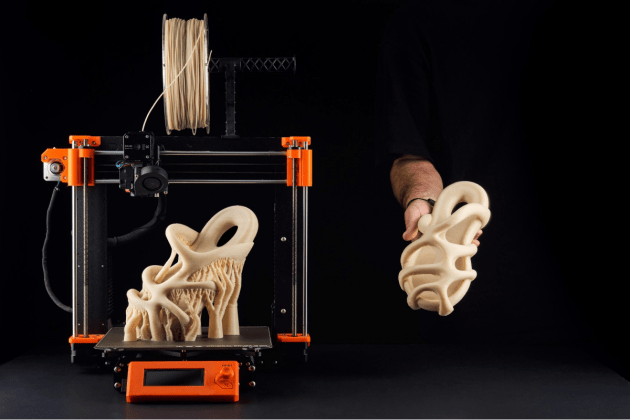Balena Partners With Former Yeezy Designer on Biodegradable Slides

Materials science company Balena has tapped a former Yeezy designer to show off what its biodegradable elastomer is capable of.
The Tel Aviv-based firm partnered with Kitty Shukman to create a 3D-printed designer slide that is fully compostable. Made with Balena’s BioCir material, Roots integrates branches and stems in the upper with organic root shapes underfoot.
More from Sourcing Journal
Cocona Labs Charges Ahead with 37.5 Biodegradable Thermoregulating Tech
Spinnova to Open R&D Spinning Operation in Portugal with Tearfil
“Partnering with Kitty to create a truly remarkable and circular product has underlined the magic that happens when you put the right material in the hands of the right designer,” David Roubach, founder and CEO of Balena, said in a statement. “Our combined creative vision has taken the dream of sustainable, scalable 3D-printing another step forward, and we hope to see leading fashion brands take a step in the same direction in the near future.”
Balena unveiled its first BioCir slide in December. The minimalist design, currently sold out, was released in a single 1,000-pair drop available only in the company’s hometown of Tel Aviv.
Shukman’s concept, on the other hand, is not available for retail, though that is something Balena is looking to accomplish in the near future, a company representative said. Instead, the firm hopes to use Roots to “push the boundaries” of 3D printing to advance adoption of compostable, biodegradable and durable materials in the fashion industry.
“I continually strive to strike a balance between functionality, sustainability, and style, and working with the Balena team to envision this new design has helped me imagine a day when our fashion industry becomes truly circular,” Shukman, who was employed as a footwear designer at Yeezy for three years, said in a statement. “I hope to see 3D-printing continue to leave its mark as a unique, bold, and sustainable medium in the fashion industry on its way to becoming climate neutral.”
According to Balena, the BioCir manufacturing process is “highly scalable” and allows for collaborations and integrations across diverse industries and “all available” manufacturing methods. At end of life, products can undergo complete decomposition and biodegradation in an industrial compost facility, it added. In Tel Aviv, where Balena released its first 1,000 slides, BioCir owners are encouraged to bring their used footwear back to one of two take-back locations.
Balena is currently pursuing the development of two different BioCir materials. One, BioCirw, is intended to enable “the creation of advanced films used in technical textiles” like PVC and EVA. The other, BioCirx, is being developed for tough and rigid products like buttons and sunglasses frames, replacing materials like POM, PP, PA and PBT.
Balena is hardly the only company tackling biodegradability in footwear. In April, luxury sneaker brand Koio introduced a shoe it claimed to be 99 percent biodegradable. In December, the plant-based fashion company Unless partnered with the circular materials firm Natural Fiber Welding to release a plastic-free decomposable sneaker. Last year, the California-based startup Blueview released a plant-based, slip-on cupsole sneaker that it claimed was fully vegan and biodegradable.
